Human physiology is the study of how the body works. It explains how cells, tissues, and organs collaborate to keep us alive and well. From breathing to digestion, the beating of the heart to the firing of nerve impulses, physiology explains the complex processes that support life.
Levels of Organisation in the Human Body
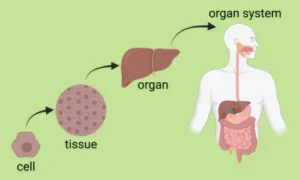
1. Cells – The smallest unit of life, specialised for specific functions (e.g., muscle cells, nerve cells).
2. Tissues – Groups of similar cells performing a common function (muscle tissue, connective tissue).
3. Organs – Structures made of multiple tissues, like the heart, lungs, and stomach.
4. Systems – Organs working together to perform complex tasks, such as circulation or digestion.
Major Systems of Human Physiology
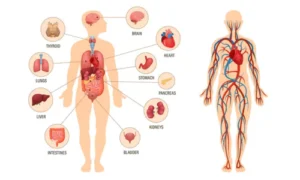
1. Circulatory System
- Function: Transports oxygen, nutrients, and hormones; removes waste products.
- Key Organs: Heart, blood, blood vessels.
2. Respiratory System
- Function: Provides oxygen to the body and removes carbon dioxide.
- Key Organs: Lungs, trachea, diaphragm.
3. Digestive System
- Function: Breaks down food into nutrients and absorbs them for energy and growth.
- Key Organs: Mouth, stomach, intestines, liver, pancreas.
4. Nervous System
- Function: Coordinates body activities and processes sensory information.
- Key Organs: Brain, spinal cord, nerves.
5. Musculoskeletal System
- Function: Supports body structure and enables movement.
- Key Components: Bones, muscles, joints, tendons, ligaments.
6. Excretory System (Urinary System)
- Function: Eliminates metabolic waste and maintains fluid balance.
- Key Organs: Kidneys, bladder, ureters.
7. Endocrine System
- Function: Controls body functions through hormones.
- Key Organs: Pituitary gland, thyroid, adrenal glands, pancreas.
8. Reproductive System
- Function: Ensures species survival by producing offspring.
- Male Organs: Testes, penis.
- Female Organs: Ovaries, uterus.
9. Immune & Lymphatic System
- Function: Defends against infections and maintains fluid balance.
- Key Organs: White blood cells, lymph nodes, spleen.
10. Integumentary System
- Function: Protects the body, regulates temperature, and prevents dehydration.
- Key Components: Skin, hair, nails, sweat glands.
Key Concepts in Human Physiology
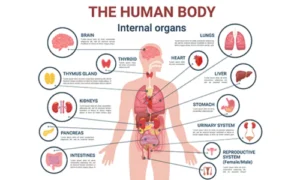
Homeostasis – The body’s ability to maintain stable internal conditions despite external changes (e.g., regulating body temperature).
Feedback Mechanisms –
- Negative feedback (stabilises functions, like blood sugar control).
- Positive feedback (amplifies responses, like contractions during childbirth).
Metabolism – All the chemical processes in the body, including:
- Catabolism (breaking down molecules for energy).
- Anabolism (building new molecules for growth and repair).
Conclusion
Human physiology is the basis for understanding how human bodies function. By examining the body’s systems and processes, we can gain insight into health, disease, and various medical therapies. It is a crucial aspect of biology that bridges science and medicine, enabling us to understand the complexities and beauty of human existence.
FAQs for Human Physiology
Q1. What is human physiology?
Human physiology is the study of how the human body functions, focusing on cells, tissues, organs, and systems that work together to sustain life.
Q2. Why is human physiology important?
It helps us understand how the body works, detect diseases, develop treatments, and improve overall health and medical science.
Q3. What are the main systems in human physiology?
The major systems include circulatory, respiratory, digestive, nervous, musculoskeletal, excretory, endocrine, reproductive, immune, and integumentary systems.
Q4. What is homeostasis in physiology?
Homeostasis is the body’s ability to maintain stable internal conditions like temperature, pH, and blood sugar despite external changes.
Q5. How is physiology different from anatomy?
Anatomy studies the structure of the body (what organs look like), while physiology studies the function of those organs (how they work).


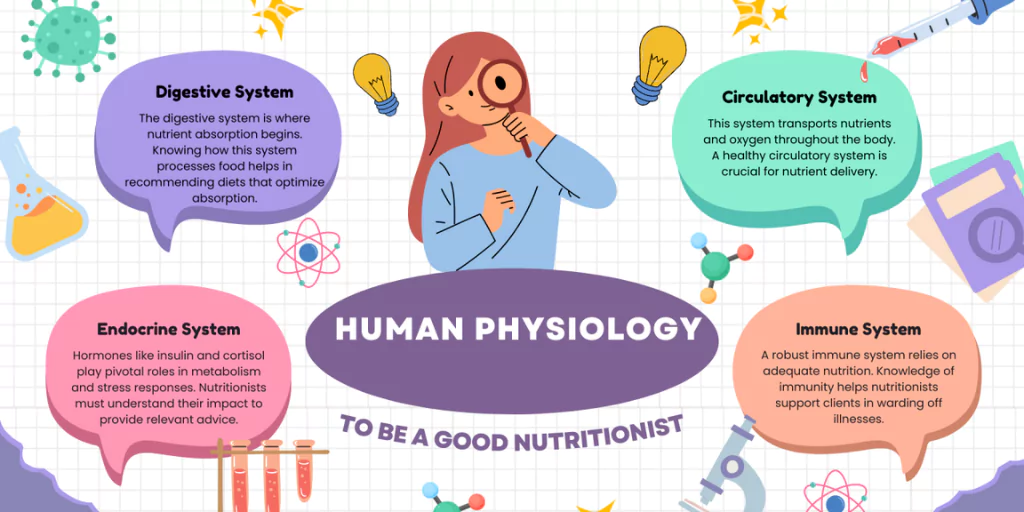
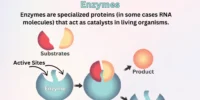



slot365 link
August 24, 2025Không phải ngẫu nhiên mà slot365 link lại chiếm được lòng tin của nhiều người chơi đến vậy, để làm được điều này nhà cái đã không ngừng nỗ lực và cải thiện chất lượng dịch vụ của mình để mang lại những thứ tốt nhất dành cho người chơi. TONY12-19